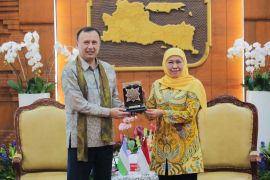MOUNTAIN VIEW, Calif., June 8, 2011 (ANTARA/PRNewswire-AsiaNet) --
FDA allows use of investigational new drug for life-threatening indications
Edison Pharmaceuticals, Inc. announced today that the U.S. Food and Drug Administration (FDA) has allowed an Expanded Access program to provide EPI-743 to seriously ill patients diagnosed with inherited respiratory chain diseases of the mitochondria. Patients with genetically confirmed disease and patients who meet specific clinical criteria, absent genetic confirmation are both eligible.
As of June 1, 2011, 40 seriously ill subjects diagnosed with genetically confirmed inherited mitochondrial disease have been treated with EPI-743 worldwide for a cumulative exposure of over 7,436 days. No significant drug-related adverse events have been observed. Initial clinical, biomarker, and brain-imaging data are encouraging. The company cautions that the data obtained in these initial studies is preliminary and needs verification in controlled prospective trials. Edison and its clinical investigator team are working closely with FDA and the European Medicines Agency to expedite prospective phase 2B/3 clinical trials. EPI-743 has received orphan designation from FDA.
Clinical Trial Sites
United States
Clinical trial enrollment sites have been established in North America at Lucile Packard Children's Hospital- Stanford University Medical Center; Akron Children's Hospital; Columbia University; Seattle Children's Hospital; Medical University of South Carolina; Children's Hospital of Philadelphia; and University of California, Los Angeles.
Additional trial sites are being established in Europe, Japan, and in North America.
Treatment Information
Edison Pharmaceuticals
- EdisonPharma.com
United Mitochondrial Disease Foundation
- UMDF.org
Friedreich's Ataxia Research Alliance
- CureFA.org
MitoAction
- MitoAction.org
United States Food and Drug Administration
- Clinicaltrials.gov
EPI-743
EPI-743 is an orally absorbed small molecule that readily crosses into the central nervous system. It works by targeting an enzyme NADPH quinone oxidoreductase 1 (NQO1). Its mode of action is to synchronize energy generation in mitochondria with the need to counter cellular redox stress(1). EPI-743 is in phase 2B/3 pivotal clinical trials.
About Inherited Mitochondrial Disease
Inherited mitochondrial diseases are genetic disorders that share as a common link defects in how cells make and regulate energy. They can arise through defects in genes located in the nucleus or mitochondria. An estimated 2,000 defects in nuclear DNA and 200 defects in mitochondrial DNA have been identified that are pathogenic(2).
Inherited mitochondrial diseases are clinically diverse and poorly understood. They can affect virtually any organ system in the body. As the brain and muscle tissue use an extraordinary amount of energy, they are dramatically affected by these disorders. Mitochondrial diseases often present with central nervous system manifestations, but they also result in a variety of other significant clinical signs that include diabetes, heart failure, liver failure, deafness, blindness, renal insufficiency, and muscle weakness and fatigue.
The incidence of mitochondrial disease is estimated at 1-5 in 10,000. However, this number may underestimate the true number of people with mitochondrial disease. While new genetic screening tools have made detection of mitochondrial disease possible, the majority of individuals with a clinical diagnosis of mitochondrial disease may not have a confirmatory genetic diagnosis. Some estimates place the number of clinically diagnosed mitochondrial disease patients without a genetic diagnosis- so called mitochondrial syndromes- at 10 times the incidence of genetically defined disease.
Science today is at the frontier of mitochondrial medicine. Certain diseases that previously lacked a known cause are now being defined as mitochondrial in etiology. It is possible that in the future mitochondrial disease will be implicated in additional diseases, such as in the biology of cancer.
Edison Pharmaceuticals
Edison Pharmaceuticals is a patient- and physician-founded company devoted to developing new medicines to transform the lives of those diagnosed with rare and neglected diseases. Currently, the company is focused on inherited mitochondrial diseases for which there are no approved drugs. These conditions are life-threatening and highly debilitating. Edison's specialized skill set spans the discovery, development, and translation of redoxbased drugs.
(1) Shrader, W.D.; Amagata, A.; Barnes, A.; Enns, G.M.; Hinman, A.; Jankowski, O.; Kheifets, V.; Komatsuzaki, R.; Lee, E.; Mollard, P.; Murase, K.; Sadun, A.A.; Thoolen, M.; Wesson, K.; Miller, G.; alpha-Tocotrienol quinone modulates oxidative stress response and the biochemistry of aging. Bioorganic Medicinal Chemistry Letters, 2011;21(12):3693-3698.
(2)
http://www.ninds.nih.gov/news_and_events/proceedings/20090629_mitochondrial.htm
SOURCE: Edison Pharmaceuticals, Inc.
CONTACT: Edison Pharmaceuticals, Inc.
info@edisonpharma.com
Editor: PR Wire
Copyright © ANTARA 2011











